What Hulu’s Hillary Documentary Should Have Learned from Miss Americana
Hulu’s series doesn’t do much to chip away at Clinton’s public persona.
Photo Courtesy of Hulu
There’s something enthralling about documentaries that attempt to slough away the glossy finish slathered over public figures, be it a pop star on the rise or a politician looking to drop their ever-present smile-and-wave routine. And it makes sense: seeing beautiful, successful people at their worst is a kind of societal schadenfreude that we all innately understand. But something that is at times harder to understand—as is the case with Hulu’s new documentary about Hillary Clinton, Hillary—is who is this for, anyway?
It matters who the intended audience for such a documentary is, because it matters what folks are able to walk away with after watching. A more intimate knowledge of who this person is? A better understanding of why they dealt with certain people or public events the way they did? What makes them tick beyond their public persona? After watching Hillary, my instinct was that I should have more of an understanding of who Clinton is when the cameras are off. Or at very least, actually see her at her worst without any form of disclaimer or sanitized filter.
And yet.
There never is a worst. In director Nanette Burstein’s ambitious four-part series, there is footage pulled together from Clinton’s historic 2016 presidential campaign, her time as President Obama’s Secretary of State, her early days in the White House as First Lady, alongside even fuzzier, more personal footage from before her time in politics: of her 1969 commencement speech at Wellesley, her time at Yale Law School, and even some clips from her early childhood growing up in the Illinois suburbs back in the 1950s. Clinton is noble and intelligent and untouchable in the way public figures’ public images tend to be. Nothing is being sloughed, just bolstered.
Burstein conducts interviews with everyone, from Clinton’s former campaign managers, to her husband Bill, to her childhood friends, to members of the press ,to Clinton herself. It’s a thorough exploration of the political and societal factors that impacted Clinton’s rise to power, and her ultimate fall from would-be grace. It is meant to show how forces outside of Clinton’s control tried to tear her down (namely, misogyny), and how she became a martyr in the press. But also, ultimately, how her biggest flaw was (and is) how she has a “responsibility gene” that prevents her from showcasing the “greatness of spirit” that the public naturally craves.
And yet.
Even presented in a medium meant to expose and truth-tell, Hillary still feels like it’s carefully constructed with a point of sale at the end of it, an image that it’s trying to shill even as it professes transparency. Having a “responsibility gene” is the equivalent of telling a potential employer that your biggest shortcoming is “caring too much about work”—it may be true, but it still feels disingenuous. Which is unfortunate, because so much of the (at times unfair) criticism that Clinton garnered on the 2016 campaign trail was that she was inauthentic, stiff, and—that word—unlikeable. It’s clear from behind-the-scene snippets that her staff never found her to be any of those things, but as a result of constantly being under public scrutiny, Clinton still comes across on the documentary as guarded, defensive, tired. And in that sense, one has to ask, again, who is this for, anyway? Hillary fans? Her detractors? Voters who are fear-watching the documentary ahead of the 2020 elections? Are we meant to learn anything new?
“I’m a private person,” she says at one point during the series. And it shows. When she reflects on the whole “baking cookies” debacle of Bill Clinton’s 1992 campaign, she simply leaves it as, “I didn’t play the game well enough.” She gets quiet, retreating into herself, when she recalls the days following her husband’s very public betrayal in 1998. “I was devastated,” she says. In reaction to her 2016 presidential election loss: “I felt like I’d let everybody down.”
-

-

-

-

-

-

-

-

-

-

-

-

-

-

-

-

-

-

-

-

-

-

-

-

-

-

-

-

-

-

-

-

-

-

-

-

-

-

-

-








































